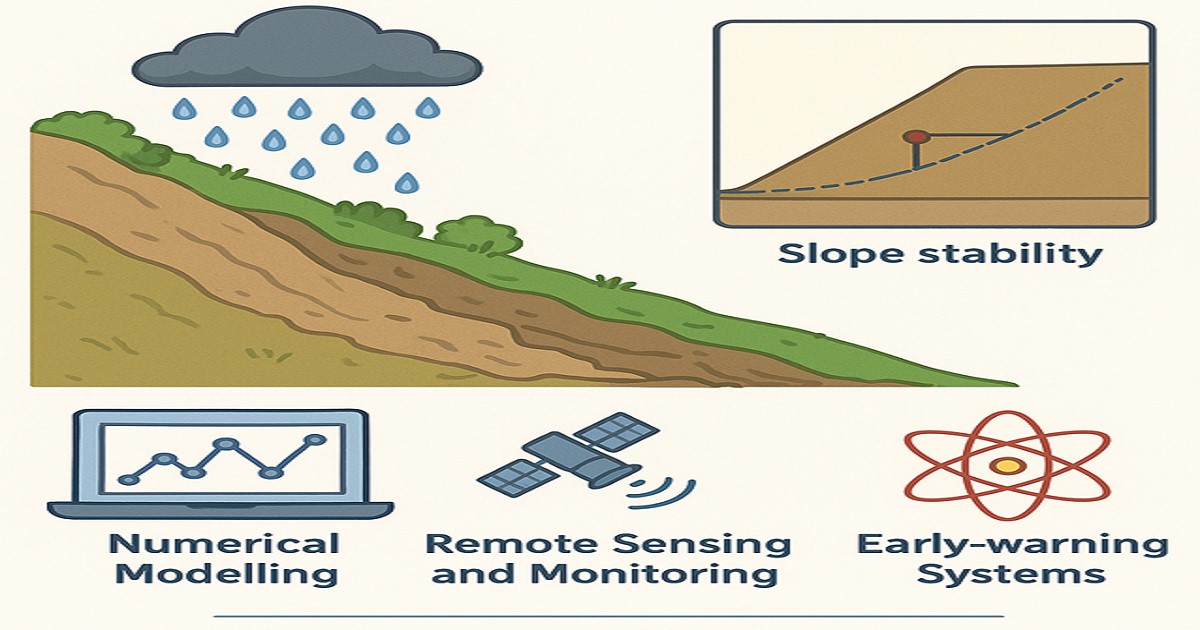- 3.0Impact Factor
- 6.0CiteScore
- 20 daysTime to First Decision
Landslide and Slope Stability Risk Assessment: Study of Rainfall-Induced Shallow Landslide
This special issue belongs to the section “Hydrogeology“.
Special Issue Information
Dear Colleagues,
Rainfall-induced shallow landslides are among the most frequent and destructive natural hazards worldwide, threatening lives, infrastructure, and the environment. Increasing urbanisation in hilly terrains, together with more intense and unpredictable rainfall events caused by climate change, has heightened the urgency to advance our understanding and management of such hazards. Despite significant progress in field monitoring, modelling, and risk assessment, challenges remain in predicting triggering mechanisms, quantifying uncertainties, and developing effective early warning and mitigation strategies.
This Special Issue aims to provide a platform for researchers, engineers, and practitioners to share the latest advances in the assessment and management of rainfall-induced shallow landslides. Contributions are invited that enhance scientific knowledge, propose innovative methodologies, and demonstrate practical applications for hazard mitigation and risk reduction.
Topics of interest include, but are not limited to, the following:
- Mechanisms and triggering factors of rainfall-induced shallow landslides;
- Field monitoring techniques, sensor networks, and remote sensing applications;
- Laboratory and numerical modelling approaches for slope stability analysis;
- Probabilistic and deterministic methods for hazard and risk assessment;
- Early warning systems and real-time forecasting tools;
- Climate change impacts on landslide frequency and intensity;
- Mitigation measures, engineering solutions, and community resilience strategies.
Dr. Chaminda Gallage
Guest Editor
Manuscript Submission Information
Manuscripts should be submitted online at www.mdpi.com by registering and logging in to this website. Once you are registered, click here to go to the submission form. Manuscripts can be submitted until the deadline. All submissions that pass pre-check are peer-reviewed. Accepted papers will be published continuously in the journal (as soon as accepted) and will be listed together on the special issue website. Research articles, review articles as well as short communications are invited. For planned papers, a title and short abstract (about 250 words) can be sent to the Editorial Office for assessment.
Submitted manuscripts should not have been published previously, nor be under consideration for publication elsewhere (except conference proceedings papers). All manuscripts are thoroughly refereed through a single-blind peer-review process. A guide for authors and other relevant information for submission of manuscripts is available on the Instructions for Authors page. Water is an international peer-reviewed open access semimonthly journal published by MDPI.
Please visit the Instructions for Authors page before submitting a manuscript. The Article Processing Charge (APC) for publication in this open access journal is 2600 CHF (Swiss Francs). Submitted papers should be well formatted and use good English. Authors may use MDPI's English editing service prior to publication or during author revisions.
Keywords
- rainfall-induced shallow landslides
- slope stability
- landslide risk assessment
- triggering mechanisms
- numerical modelling
- remote sensing and monitoring
- early warning systems
- climate change impacts
- hazard mitigation
- geotechnical engineering

Benefits of Publishing in a Special Issue
- Ease of navigation: Grouping papers by topic helps scholars navigate broad scope journals more efficiently.
- Greater discoverability: Special Issues support the reach and impact of scientific research. Articles in Special Issues are more discoverable and cited more frequently.
- Expansion of research network: Special Issues facilitate connections among authors, fostering scientific collaborations.
- External promotion: Articles in Special Issues are often promoted through the journal's social media, increasing their visibility.
- e-Book format: Special Issues with more than 10 articles can be published as dedicated e-books, ensuring wide and rapid dissemination.

